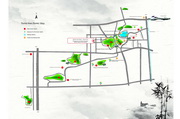
Shanghai races to fend off latest COVID-19 outbreak
( chinadaily.com.cn )
Updated: 2022-03-11
|
|||||||||
Shanghai public health authorities are racing against the clock to curb the recent outbreak of COVID-19 as the city is experiencing a surge of imported and locally transmitted cases.
One of the country's busiest international transport hubs, Shanghai reported 696 imported cases, 62 of which are asymptomatic, from March 1 to 10. There has also been 396 locally transmitted cases, with 362 of them being asymptomatic, since March 1.
Unlike previous outbreaks in the city, this latest outbreak features several transmission links between cases reported in almost all districts in the municipality.
"As a key port city, Shanghai has always faced great pressure in preventing the spillover of imported COVID-19 cases and controlling the growth of domestic cases," said Wu Jinglei, director of Shanghai Municipal Health Commission.
"We shall continue to stick to the 'dynamic zero-COVID strategy' and accelerate mass testing as well as closed-loop transport and quarantine of COVID patients."
By Thursday, epidemiological investigations have identified around 12,000 close contacts and 22,500 secondary contacts. Authorities have also screened half a million people who might have been exposed to COVID-19.
Li Qiang, Shanghai's Party chief, who is currently in Beijing attending the National People's Congress, held a video conference regarding Shanghai's epidemic control on Tuesday, stressing that different departments should quickly respond and monitor key nodes such as transport hubs, hospitals and schools to prevent the spread of the virus.
On Thursday, some parks and cultural facilities in the city, including the Shanghai Museum, Shanghai Natural History Museum and Museum of Art Pudong, announced that they were suspending operations in the wake of the current outbreak.
Municipal officials said that related departments have been striving to reduce the inconvenience faced by quarantined residents, and special arrangements have been made to care for the pregnant and the sick.
Students currently undergoing quarantine are able to take online classes through a municipal online learning platform with over 11,300 video courses. The commission will also continue upgrading online teaching resources, according to the Municipal Education Commission.
Official Website of the Sheshan National Tourist Resort, Shanghai


